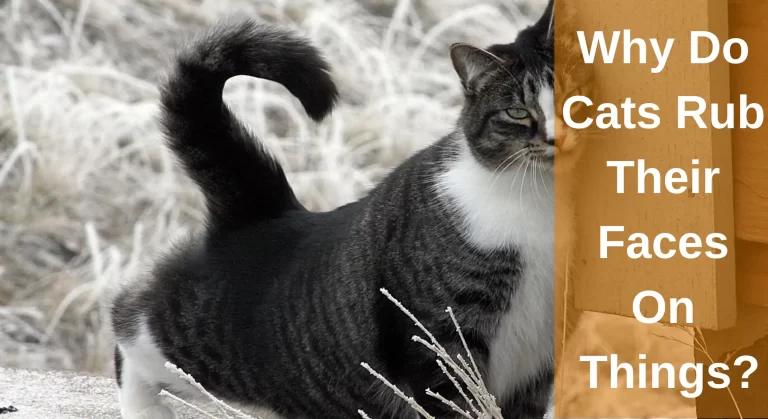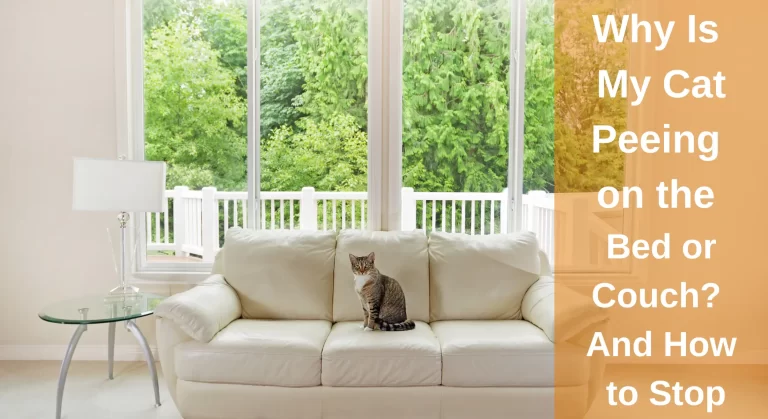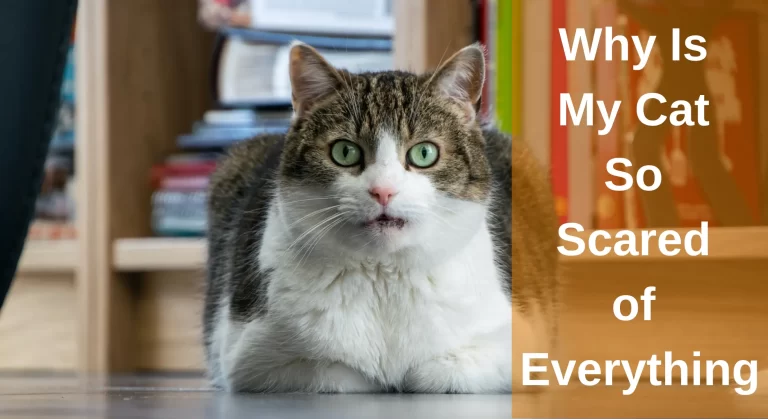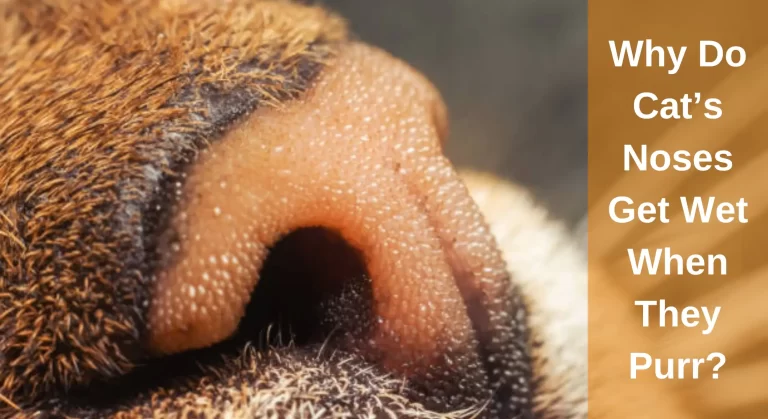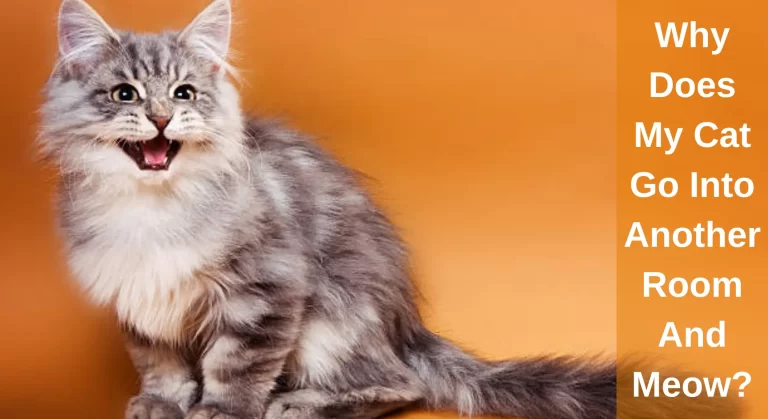Why Does My Cat Meow at Night When I Go to Bed? Reasons You Should Know
The sound of your cat meowing at night is something you should be concerned about if your cat does it. Your cat should not meow at night unless he has something to say. Many cat lovers drag themselves out of bed in order to quiet their feline buddy. It’s essential to comprehend a cat’s meows if you want to know what it wants and needs.
So, why does my cat meow at night? Your cat might meow at night because he feels stressed, boredom, lonely, unstimulated, or just wants to go outside. The easier it is to calm your cat at night after you find out why he meows at night, the easier it will be for you to soothe him.
Here is a deeper look at all the possible causes of cats’ meowing at night, ranging from hyperthyroidism and boredom to stress and ageing. The factors that might affect the owner’s sleep are as given below.

Reasons Why Does My Cat Meow at Night When I Go to Bed?
1. Your Kitty is Anxious
Your new cat appears to scream frequently at night. Kittens or cats that have recently been adopted meow a lot at night since they haven’t fully acclimated to their new environment. They seek assurance from their new owner since they are still adjusting to their surroundings and are feeling anxious.
Also Read: Why Does My Cat Go Into Another Room And Meow?
2. The Cat’s Crepuscular Nature
Domestic cats are crepuscular creatures, meaning that dawn and nighttime are when they are most active. Given that they are still in this awake and active condition when you go to bed at night, your cat may meow. They are begging for your attention and urge you to join them.
Kittens frequently have more nocturnal sleeping habits and are a lot busier at night. Sometimes, after fully adapting to their owners’ routine, cats may sleep through the night.
3. Wild Cats Experience Confinement
Your cat meows at the door at night, right? Because they feel confined within your home, outdoor cats may act in this manner when you go to bed.
They enjoy having adventures and are most active at night and early in the morning. Cats meow at the door to get your attention and for you to open it for them.
4. Your Cat Needs to Eat or Drink
When cats are hungry or thirsty, they regularly meow at people to let them know. It’s conceivable if you haven’t given them food in a while or if you haven’t refilled their water bowl.
Maintaining a consistent feeding plan may also help your cat recognise meal and bedtime times.
5. Hyperactive Thyroid
Particularly older or middle-aged cats are more prone to hyperthyroidism. The body overproduces the thyroid hormone in this instance. These play a part in the regulation of metabolism, and the following symptoms are typically seen in cats with an overactive thyroid:
- Despite an increase in appetite, unexpected weight loss occurs.
- Increased thirst and urination.
- Diarrhoea and gagging greasy, matted, or unkempt coats are strange behaviour and fits of enthusiasm in cats.
Find Out: Signs Your Cat is Dying of Thyroid Disease: All You Need To Know
6. Older Cats Appear Confused
Your senior cat is likely confused. Cats typically experience sensory decline as they age. They will start to experience hearing, smell, and vision loss. Because you are nearby, they could feel comfortable spending the day at their home.
However, while you and your family are sound asleep at night, they may feel completely adrift and want help.
How to Stop a Cat’s Nighttime Meowing?
If cats aren’t active throughout the day, they might want to burn off some energy at night. It will help with the burn and improve your chances of having a decent night’s sleep if you work out kitty before bed.

- By utilising wand toys that make her leap or playing chase with a ball, you might get some of the cat zoomies that keep you up at night.
- Give your cat food and clean water right before you go to bed. After a good meal, even folks may nod off.
- Determine which one applies if you wish to stop your cat from waking you up at night by meowing. There are several probable explanations, ranging from natural tendencies toward the crepuscular to declining cognition and hyperthyroidism. Here are ideas for decreasing nocturnal meowing.
Tips: How to Prevent a Cat from Meowing at Night
Does your cat’s meowing keep you up at night? Not just you, either. Many cat lovers struggle to get out of bed to soothe a frightened cat.
During the night, a cat will vocalise to indicate needs like hunger, thirst, or loneliness. It will be simpler to soothe your cat after you determine why he fusses at night.
Be cautious about consulting a veterinarian before implementing any recommendations for your cat. Like people, cats can scream out in pain or as a result of illness. After checking out any health concerns, consider any of these methods to get your cat to stop meowing all night:

1. Give the Essentials, such as Food and Liquids
Your cat may start meowing in the middle of the night to let you know that she needs food or water. Refill your cat’s water bowl before retiring for the evening. They won’t ask for a drink to avoid waking you up at three in the morning.
2. Play and Pet Your Cat for a Long Time before You go to Sleep
Some felines cry at night because of loneliness, boredom, or anxiety. If you’ve been out at work all day, your cat craves your company and connection.
3. Use Nightlights to help Senior Cats Who may be Suffering from Vision Issues
When senior cat with visual problems or cognitive impairment can see their surroundings, they may feel less worried and more comfortable, which should reduce their evening caterwauling.
4. Don’t respond to Your Cat When it Meows at Night
Ignore your cat if you believe that his evening vocalisations are not an effort to seek your attention and that all of his requirements are being addressed.
Even though it can be challenging, your cat will learn that no amount of useless meowing will get you out of bed if you ignore the behaviour without scolding or punishing it.
5. Watch Out for any Noises or Lights that Can startle Your Pet
A loud noise or even light entering via a gap may be the cause of all the meowing outside your bedroom door.
Cats can hear sounds up to 64,000 hertz (HZ), so you might not even hear what’s troubling your cat. LED lights and flashing computer screens at night might annoy your cat.
6. Set Your Cat’s Body Clock back
By being active while playing in between naps, your cat may be able to stay awake during the day. Before it becomes dark, schedule a robust play session with your feline partner to further tyre him out.
Dinner is followed by playtime. Your cat’s screams for a late-night snack will go away if you move the timing of his meals.
7. Make sure the Litter Box is Cleaned before bed
Cats like to use brand-new, spotless litter boxes to relieve themselves. Therefore, a dirty litter box may be the reason for your cat’s nighttime whimpering. Try scooping before bed to ensure your favourite pet has a clean place to urinate.
In addition to being scooped once or twice a day, your cat’s litter box should be thrown out once a week and thoroughly cleaned using a safe, ecologically friendly cleaner.
Frequently Asked Questions
Should I ignore my cat meowing at my door at night?
When your cat starts meowing, it is best to ignore your cat if he meows at night if he is well fed, watered, played with, and physically fit since attention will reinforce the behaviour. Your cat may end up meowing even more if you do this.
Is it normal for my cat to meow in their sleep?
When cats meow when they sleep, it simply means they are dreaming and vocalizing, as we all do from time to time.
She might have been experiencing a nightmare or be in deep sleep when she meows when she wakes up.
Why does my cat wake me up in the middle of the night
For various reasons, your cat could wake you up in the middle of the night. Your cat might not get enough stimulation, enrichment, and exercise when it’s active, so it might be fully awake and ready to play when you’re about to nod off to sleep.
Are cats good nighttime companions?
Cats who sleep with you can better protect themselves from harm because they are conscious of their vulnerability when left alone. Sleeping near the foot of the bed will provide your cat with an excellent view of the room, enabling them to alert you or get away if necessary in case of an emergency.
Why does my cat meow at night with her toy in her mouth?
A major reason why cats meow with their toys is to play with them as well as want your attention to take notice of them and the toy they are holding.
Final Thoughts!
There are several probable explanations, ranging from natural tendencies toward the crepuscular to declining cognition and hyperthyroidism. Determine which one applies if you wish to stop your cat from waking you up at night by meowing.
After that, use all of the suggestions I’ve made in this post to help you deal with the issue. Soon, you’ll both be getting a good night’s rest.
Related Posts:
- Why Does My Cat Meow at the Door?
- Why Does My Cat Meow When I Sneeze?
- My Cat Keeps Meowing And Rubbing Against Everything
- My Cats Meow is Weak and Raspy – Why And How to Help?
- Why Does My Cat Meow Loudly After Using the Litter Box?
- Why is My Cat Drinking a Lot of Water and Meowing?
- Why Does My Pregnant Cat Keeps Meowing?
Who is Isabella?
My name is Isabella, and I am a dedicated and knowledgeable cat enthusiast. With years of experience caring for cats and a deep love for felines, I made a mission to help other cat lovers navigate the challenges of cat ownership.

